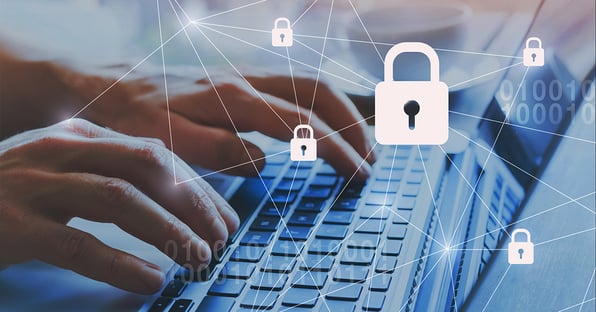Data Security for Home Health & Hospice

Home health and hospice care teams rely on accurate patient data to provide effective and personalized care. Software can help streamline information-sharing between providers, and organizations have a legal and ethical obligation to safeguard this sensitive data.
The right platform can help organizations work more efficiently while keeping vital data safe. Here's what you need to know about data security for home health and hospice.
Introduction to Data Security in Home Health and Hospice Care
Healthcare providers need immediate access to up-to-date patient information. That is especially critical in home health and hospice care settings where patients might be particularly vulnerable and have complex health needs.
However, while digital platforms might offer faster access to information, they also leave organizations vulnerable to data breaches. It’s essential to work with an electronic health records platform that ensures rapid and efficient dissemination of information while prioritizing data privacy and security.
Understanding the Threat Landscape for Home Health and Hospice
According to the Centers for Disease Control and Prevention (CDC), there are 11,400 home health agencies and 5,200 hospice care agencies in the U.S. Those numbers represent thousands of people who receive individualized health care, often from health professionals in different disciplines.
Each patient has health records that providers need to access regularly. These records contain highly sensitive and confidential patient data, making it essential to implement robust data security and privacy measures. Healthcare data is particularly vulnerable to theft and nefarious use. One in 3 Americans were victims of health data breaches in 2023, an alarming figure showing the scope of the problem.
The Critical Role of Document Management in Data Security
Healthcare teams rely on documents for every step of the patient management process, from specialist referrals to daily nursing logs. These documents facilitate optimal care when healthcare professionals have instant access to them. Electronic documents are critical because they help reduce errors and keep patients safe.
At the same time, organizations must never sacrifice patient privacy for the sake of administrative expediency. When data is not secure, it’s vulnerable to accidental deletion or manipulation that threatens patient well-being. That’s why an effective document management system should include data security measures.
Implementing Effective Data Security Measures
So, what is data security in healthcare? There are several components of data security that contribute to the efficient management of data. It’s fundamental to partner with a data security provider that can ensure your data is protected from attack, loss, theft, or manipulation. These technology partnerships are the first steps to data security your organization can rely upon.
It’s also essential to support your technology platform with administrative strategies and policies for data protection. You might consider:
- Creating a team to make a plan on how to secure healthcare data
- Conducting regular system audits
- Hiring a chief technology officer
- Developing a contingency plan in the event of a data breach
- Having physical security measures where data is stored
- Protecting electronic data with encryption, firewalls, antivirus software, and cloud computing
Legal and Regulatory Considerations for Data Protection
Healthcare providers have a legal obligation to protect patient data because of the Health Insurance Portability and Accountability Act (HIPAA). This law prevents the disclosure of sensitive patient data without the individual's consent or knowledge. It also requires providers to secure any individually identifiable health information in electronic format.
Failure to comply with HIPAA can result in significant fines and penalties for organizations. Violating HIPAA can also damage an organization's reputation. The U.S. Department of Health and Human Services (HHS) regularly investigates claims of HIPAA violations and oversees HIPAA enforcement.
The Future of Data Security in Home Health and Hospice Care
As the aging population grows rapidly in the U.S. and people live longer, the need for home health and hospice care services will only increase. Technology will only become more integral to fostering an efficient, patient-centered health system. This reliance on technological systems highlights the importance of data protection and security.
Data security platforms will have to adapt to the fast-evolving technology landscape to meet the growing needs of healthcare providers. The need for accurate and timely data reporting will only increase, and security professionals will continue to help organizations meet this need.
Enhancing Data Security Practices for Safety and Compliance
Home health and hospice care organizations perform an essential service by caring for the health needs of people with complex needs. Implementing data protection strategies to protect personal health information is a legal obligation. It also helps improve patient care by reducing errors and enabling the efficient exchange of vital information. WorldView can help you improve your document data security today. Contact us to see how.
Blog Post Tags
HealthcareGet Awesome Content Delivered Straight to Your Inbox!
Posts by topic
- Healthcare
- Business
- AI
- Hospice
- AP Workflows
- Home Care Management
- hospice-care
- General
- Industry Insights
- agency
- Blog
- Commercial
- reporting
- Data Analytics
- billing
- referrals
- News
- Referral AI
- business goals
- Operations
- business development
- partners
- Integration
- Healthcare Trends
- leadership
- Medicare
- Compliance
- audit
- medicaid
- Better Charting
- Home Health Reimbursement
- Medicare Compliance
- regulations
- Application
- Automation
- CMS Updates
- finance
- hospice workflow
- mobile documentations
- secure messaging healthcare
- CRM
- DMSi
- Events
- KanTime
- LUPA Threshold
- Press Release
- Revenue Growth
- healthcare workflow
- home Health Operations
- home health leadership
- home health mobile documentation
- home health workflow
- hospice field documentation
- AP Automation for Distributors
- Announcements
- Artificial Intelligence
- Digital Health Tools
- ECM Tools
- EHR
- ERP upgrade
- ESign
- Guides
- Homecare Homebase
- Mobile
- PDGM 2026
- Physician Order Tracking
- accounts payable burnout
- axxess
- clinical
- clinician trust
- clinician workflow challenges
- distribution accounting workflow
- distribution tech
- document management
- field document tools
- field to office documentation gaps
- healthcare operations
- healthcare staff burnout
- home health technology
- hospice executive operation
- hospice operation management
- interoperability
- invoice processing automation
- mobile workflow automation
- ops checklist
- payor
- workflow automation
- workflow reliability See All See Less



.png?width=596&name=31%20(1).png)
.png?width=596&name=1%20(19).png)